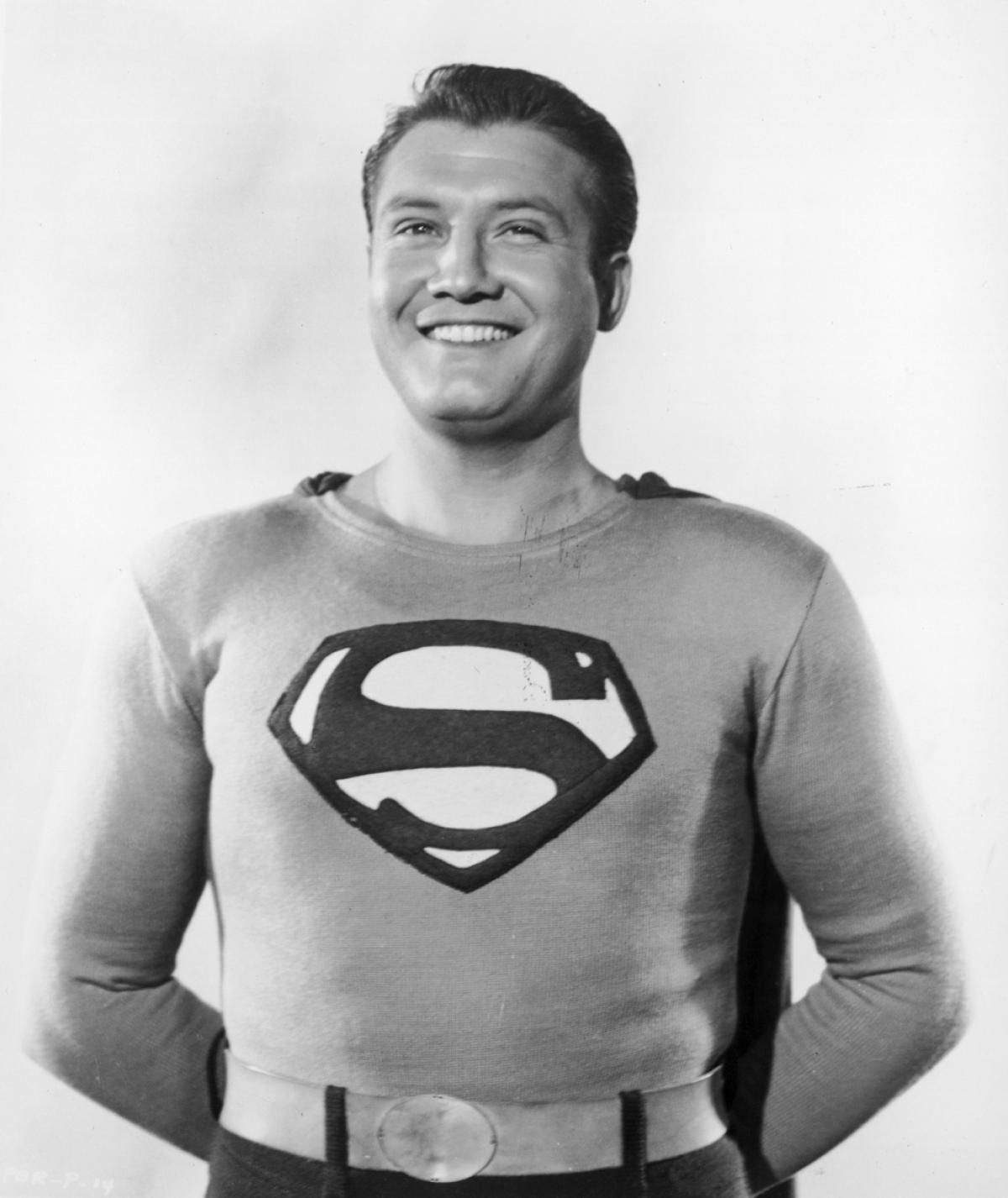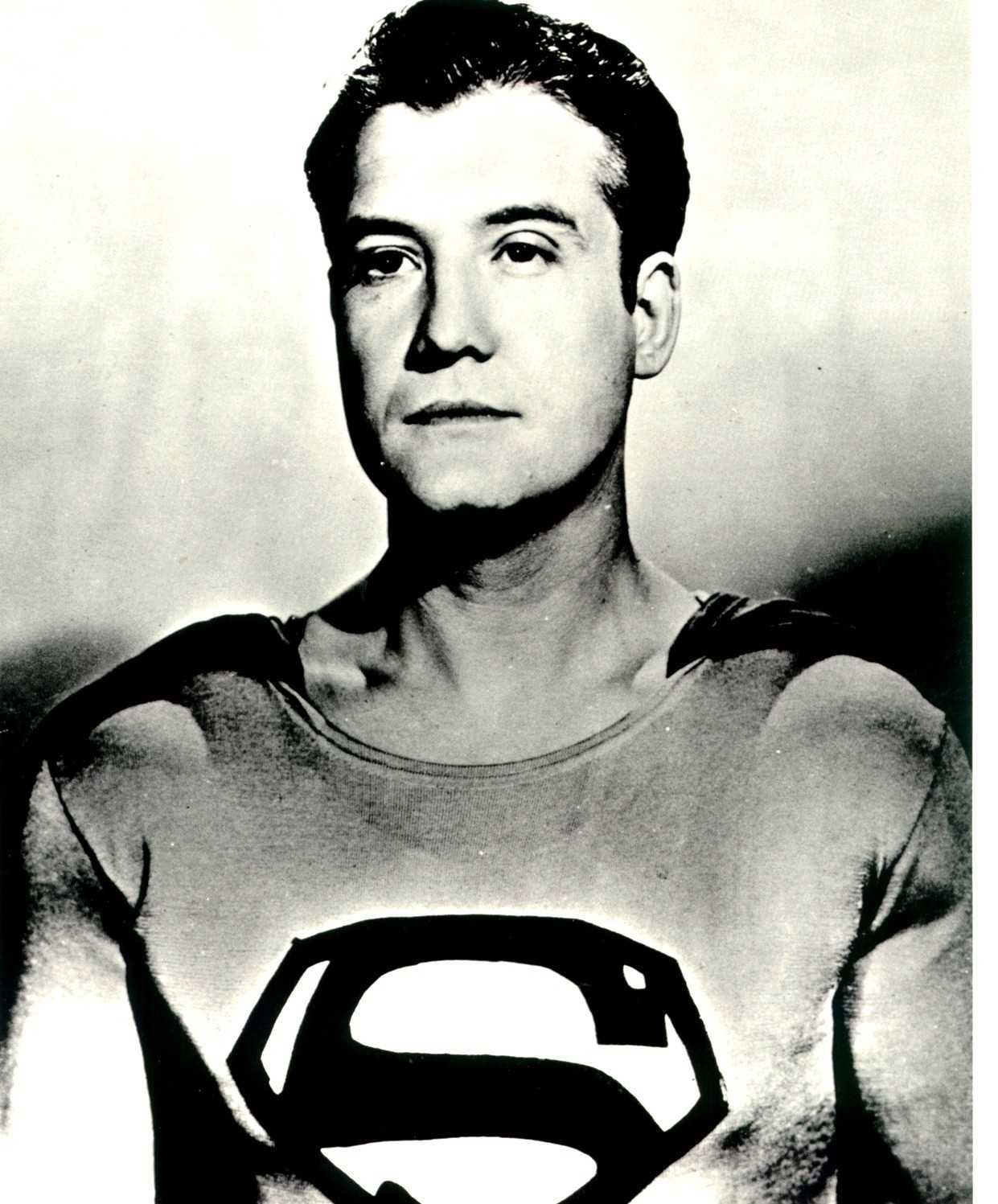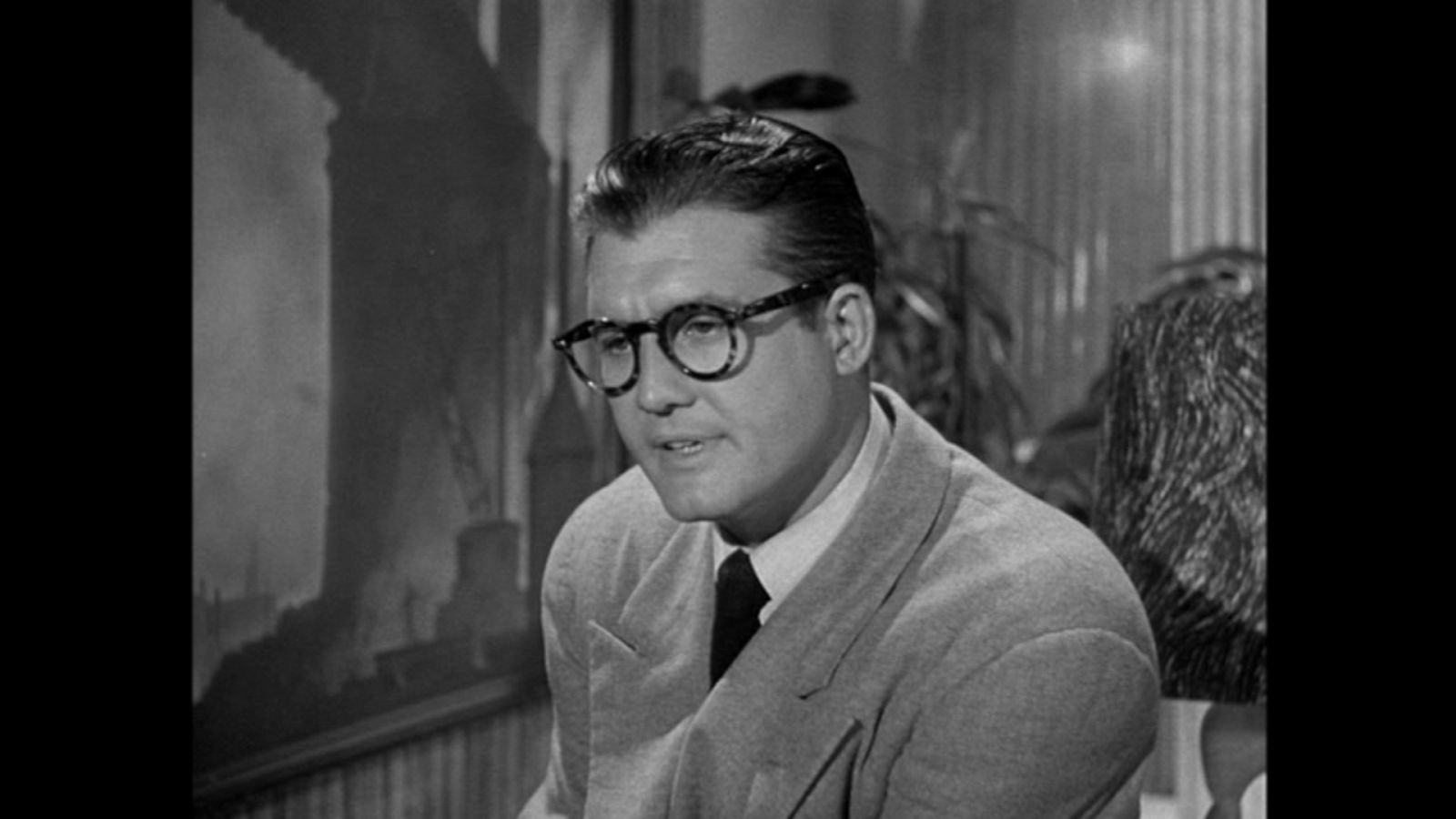George Reeves - The Enduring Story
The name George Reeves, for so many people, still echoes with the distinct sound of a superhero taking flight. He was, in a way, the very first person to bring the Man of Steel to life on the television screen, making him a truly unforgettable part of countless childhoods. His portrayal of Superman, the iconic figure from the comic books, became something truly special for viewers, establishing a visual for a character that had, until then, mostly lived in the pages of printed stories or on the radio waves.
This individual, whose actual birth name was George Keefer Brewer, stepped into the role of Clark Kent and his super-powered alter ego, creating a lasting impression that continues to be remembered by fans of the character even now. The television series, known as 'Adventures of Superman,' did more than just entertain; it transformed George Reeves from an actor into a recognizable face, a name spoken in homes across the country, basically a household presence.
Yet, the story of George Reeves, despite the bright capes and heroic deeds he depicted, holds a rather unsettling and, in some respects, a very sad chapter. His life, which seemed to soar so high with fame and recognition, came to an abrupt and debated end. The circumstances surrounding his passing have, you know, left a lingering question mark, a puzzle that still intrigues and perplexes many who look back at his remarkable, yet ultimately tragic, path.
Table of Contents
- George Reeves - A Life Story
- Early Years of George Reeves
- The Iconic Role - What Made George Reeves a Household Name?
- Playing Superman - The Impact on George Reeves
- The Unsettling End - Was George Reeves' Death a Mystery?
- The Official Ruling and Doubts Around George Reeves' Passing
- The Lasting Legacy - How Do We Remember George Reeves?
- George Reeves' Place in Pop Culture History
George Reeves - A Life Story
The individual we know as George Reeves actually began his existence with a different set of names. He was born George Keefer Brewer, a name that, you know, sounds a bit different from the one that would later become synonymous with a flying hero. His beginnings were in a place called Woolstock, Iowa, a rather quiet spot in the United States. His parents were Helen Roberta Lescher and Donald C. Brewer, and it’s interesting to consider that his heritage included both German and English roots, which is that common blend found in many American families.
So, the person who would eventually become a television sensation had quite humble origins, far from the bright lights of Hollywood or the bustling sets where he would later perform. His path from a small town in Iowa to the big screen and then the even bigger small screen of television is, in a way, a very typical American story of aspiration and achievement. It’s almost as if he was destined for something grander, even if the specifics of that grandness were yet to be seen during his early years. This transformation from George Keefer Brewer to the more famous George Reeves is, you know, a part of his overall personal story, marking a shift in his public identity as he moved into the performing arts.
Early Years of George Reeves
To fully appreciate the journey of George Reeves, it helps to understand a little about where he came from. Born in Woolstock, Iowa, he was, in some respects, a regular kid growing up in a time very different from our own. His initial name, George Keefer Brewer, was the one given to him by his mother, Helen Lescher, and his father, Donald Brewer. The details of his early family life are, you know, part of the fabric that made him the person he became. His background, a mix of German and English ancestry, speaks to the diverse heritage that many individuals in the United States share, shaping their personal narratives.
His early life, before the fame and before the iconic role, was, you know, just like anyone else's, filled with the everyday experiences that form a person's character. It’s pretty fascinating to think about how someone from such an unassuming start could go on to achieve such widespread recognition. This period of his life, while not as widely documented as his later career, was, in a way, the foundation upon which his future endeavors were built. The very beginnings of George Reeves, the individual, are rooted in these early experiences, shaping the man who would eventually don the famous red and blue costume.
| Detail | Information |
|---|---|
| Birth Name | George Keefer Brewer |
| Date of Birth | (Not provided in original text) |
| Place of Birth | Woolstock, Iowa, U.S. |
| Parents | Helen Roberta Lescher (mother), Donald C. Brewer (father) |
| Nationality | American |
| Ethnicity | Of German and English descent |
| Known For | Portraying Clark Kent/Superman in 'Adventures of Superman' |
| Date of Passing | June 16, 1959 |
| Place of Passing | Benedict Canyon home |
| Cause of Passing | Gunshot to the head (ruled suicide, but controversial) |
The Iconic Role - What Made George Reeves a Household Name?
For many, the image of George Reeves is, quite simply, Superman. He became best known for his portrayal of Clark Kent, the seemingly ordinary reporter, and his powerful alter ego, Superman, in the television series titled 'Adventures of Superman.' This show, you know, truly took off in the 1950s, captivating audiences week after week. It was, in some respects, the very first time the Man of Steel had a regular, live-action presence on the small screen, making it a truly significant moment in the history of comic book adaptations. The series had a way of drawing people in, making them believe in the hero who could fly and fight for what was right.
The impact of this particular role on George Reeves's life was, in a way, enormous. The series made him a household name, a face and a voice recognized by millions of people, especially children, who looked up to his heroic depiction. It’s almost like he became the real-life embodiment of the character for an entire generation. This level of fame, while certainly bringing widespread recognition, also, you know, brought an end to certain aspects of his acting career. It’s often the case that actors who become so strongly associated with one particular role find it rather challenging to be seen as anything else by the public or by casting directors. This typecasting, as it's sometimes called, can, in some respects, limit opportunities for other kinds of work, basically putting a ceiling on an actor's range.
Playing Superman - The Impact on George Reeves
Taking on the role of Superman was, for George Reeves, a double-edged sword, you know. On one hand, it propelled him into a level of public awareness that few actors ever achieve. His face, his voice, his very presence became intertwined with the character of Clark Kent and the flying hero. Children, and even adults, truly adored his performance, seeing him as the genuine article. The show, 'Adventures of Superman,' was a constant fixture in homes, and George Reeves was, in a way, the reason for that widespread appeal. This kind of widespread adoration is, of course, something many performers dream of.
However, the very success that made him so famous also, in some respects, put a kind of limitation on his professional path. The phrase "brought an end" in the context of his career suggests that while he gained immense popularity as Superman, it may have, you know, closed doors to other acting opportunities. It’s a common story in Hollywood: when an actor becomes so strongly identified with one character, it can be really hard for audiences, and even for industry insiders, to imagine them in a different kind of part. This intense association, while a testament to his performance, arguably became a barrier for George Reeves, making it tough to move beyond the cape and tights.
The Unsettling End - Was George Reeves' Death a Mystery?
The story of George Reeves, for all its bright, heroic moments, takes a truly somber and, you know, rather puzzling turn with the events of June 16, 1959. On that particular day, George Reeves was found deceased in his home located in Benedict Canyon. The cause of his passing was a gunshot wound to the head. What makes this event so enduringly talked about is that, while it was officially ruled a suicide, there are many who, to this very day, believe it was, in some respects, a murder. This lingering question, this debate, has, you know, kept his story in the public conversation for decades, making it more than just a footnote in Hollywood history.
The circumstances surrounding his passing have, for many, raised more questions than they have provided answers. The idea that someone so publicly adored, who embodied strength and heroism, could meet such a sudden and violent end, is, in a way, very hard for some to reconcile with the official explanation. The lack of clear evidence, or at least evidence that satisfies everyone, has only, you know, fueled the various theories and discussions that continue to surround the final moments of George Reeves's life. It's a truly unsettling aspect of his narrative, adding a layer of mystery to the legacy of the man who was Superman.
The Official Ruling and Doubts Around George Reeves' Passing
The official police reports, from the very beginning, consistently ruled George Reeves's death a suicide. This was the conclusion drawn by authorities in 1959, stating that the gunshot wound was self-inflicted. However, to this very day, that official ruling remains a source of significant controversy and, you know, quite a bit of debate among people interested in the case. The idea that it might have been something else, perhaps a murder, has persisted, largely due to what some perceive as a lack of compelling evidence to definitively support the suicide theory. This absence of clear-cut proof has, in some respects, allowed alternative explanations to take root and continue to be discussed.
When his body was discovered, the scene was, you know, quite stark. A group of individuals ran upstairs to find George Reeves, unclothed, stretched out on his bed, with a bullet hole visible in his right temple. This immediate scene, as described, is, in a way, very unsettling and has contributed to the persistent questions. The ongoing discussion about whether his passing was a suicide or something more sinister is, you know, a testament to the enduring mystery that surrounds the end of George Reeves's life. It's a story that, despite the official pronouncements, continues to be re-examined and talked about, keeping the tragic history of the actor very much alive in public memory.
The Lasting Legacy - How Do We Remember George Reeves?
Despite the tragic and debated circumstances of his passing, George Reeves, the actor who first brought Superman to television screens, has, you know, undoubtedly become a legend for fans of DC Comics and the superhero genre as a whole. His portrayal set a standard for how the character could be presented in live-action, creating a blueprint that, in some respects, influenced later interpretations. He is remembered not just for the role itself, but also for the way he embodied the character's goodness and strength, making him a truly iconic figure in the annals of pop culture history. His image, often seen posing as Superman in his backyard, is, you know, a very familiar sight to many who appreciate the early days of televised superheroes.
His story, while marked by this enduring fame, also carries with it a tragic history. This dual nature of his legacy – the celebrated hero and the individual whose life ended in such a puzzling way – is, in a way, what makes his narrative so compelling. People are drawn to the mystery, but they also hold a deep affection for the hero he represented. The memory of George Reeves, therefore, is a mix of admiration for his work and a lingering sadness about the questions that surround his final moments. It's almost as if the very mystery adds another layer to the legend, making his story, you know, even more unforgettable.
George Reeves' Place in Pop Culture History
George Reeves holds a truly special spot in the collective memory of television viewers and comic book enthusiasts. He was, in some respects, the original live-action Superman for a generation, a pioneer in bringing such a beloved character from the pages of comic books directly into people's homes. His work on 'Adventures of Superman' cemented his place as a cultural icon, and his image, you know, is still instantly recognizable to those familiar with the history of the character. He basically helped define what a superhero could look like on screen, influencing countless portrayals that came after him.
The impact of his performance extended beyond just entertainment; it helped shape the very idea of Superman for millions. This lasting influence is, you know, a testament to the power of his portrayal. Even with the passage of time and the emergence of new actors taking on the cape, George Reeves's version of Superman remains a significant touchstone. His story, including the sad ending, contributes to a larger narrative about fame, identity, and the lasting impression an actor can leave. He is, in a way, forever tied to the Man of Steel, a connection that continues to resonate with fans across different age groups.
Exploring the Unofficial Stories of George Reeves
Beyond the official accounts and the widely recognized role, there are other narratives that contribute to the broader story of George Reeves. For instance, there's a book by Jim Hayde, titled 'Flights of Fantasy: The Unauthorized But True Story of Radio & TV's Adventures.' This particular work suggests that there's more to the story than just the simple facts presented in official reports. The very title, you know, "unauthorized but true," hints at a deeper look into the events and circumstances surrounding George Reeves's life and, more specifically, his passing. It's almost as if it promises to reveal aspects that the public might not otherwise consider, providing a different lens through which to view his journey.
Such unofficial stories, while not always part of the mainstream narrative, play a truly significant role in how we collectively remember public figures, especially those whose lives ended under mysterious circumstances. They offer different perspectives, often drawing on interviews, personal accounts, or re-examinations of existing evidence. This kind of exploration adds a layer of depth to the memory of George Reeves, acknowledging that his story is, you know, more complex than a simple headline might suggest. It allows for a continued conversation about the man behind the cape, keeping his personal history alive in a very active way.
"Flights of Fantasy" and the Narrative of George Reeves
The book 'Flights of Fantasy' by Jim Hayde is, in some respects, a key part of the ongoing conversation about George Reeves. Its focus on being "The Unauthorized But True Story of Radio & TV’s Adventures" suggests an attempt to uncover details that might have been overlooked or, you know, simply not widely publicized. This kind of investigative approach often seeks to provide a more complete picture, especially when dealing with events that have been officially closed but continue to spark public curiosity. It’s almost like an invitation to look beyond the surface and consider alternative viewpoints regarding the life and, particularly, the death of George Reeves.
Works like this contribute to the broader narrative that surrounds George Reeves, ensuring that the questions about his final moments remain a topic of discussion. They highlight the fact that even with official rulings, there can be a persistent desire for more answers, for a sense of closure that, you know, perhaps hasn't been fully achieved for everyone. This ongoing inquiry into the life of George Reeves, fueled by accounts such as Hayde's, keeps his story from fading into simple historical record, making it a very active and evolving part of popular memory.

Pictures of George Reeves

Pictures of George Reeves

Pictures of George Reeves